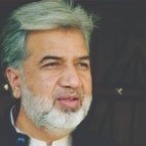

Go to Admin » Appearance » Widgets » and move Gabfire Widget: Social into that MastheadOverlay zone

The prosecution in high treason case against General (R) Pervez Musharraf had completed its job by closing the evidence in Sept 2014 but the case lingered on for over five years because of the delaying tactics adopted by the defendant.
Facts of the case belie propaganda, unleashed by dictator’s supporters, that the Special Court decided Musharraf’s fate in an indecent haste and without giving the former dictator opportunity to defend himself.
General (R) Pervez Musharraf was facing the most serious case of high treason, which under the law was required to be tried and decided speedily, but it took the court six years to decide the case mainly because ofthe delays caused by Musharraf.
Under Criminal Law Amendment (Special Court) Act 1976, “No trial before the Special Court shall be adjourned for any purpose unless the Special Court is of opinion that the adjournment is necessary in the interests of justice, and, in particular, no trial shall be adjourned by reason of the absence of any accused person due to illness, or if the absence of the accused or his counsel has been brought about the accused person himself, or if the behaviour of the accused person prior to such absence has been, in the opinion of the Special Court, such as to impede the course of justice but, in any such case, the Special Court shall proceed with the trial after taking necessary steps to appoint an advocate to defend any such accused person.”
But despite this clear legal position, Musharraf trial continued for six long years. Criminal Complaint No 1/2013 under Section 3 and 5 of the High Treason (Punishment) Act 1973 and Section 5 of the Criminal Law Amendment Special Act was instituted against General (R) Pervez Musharraf before the Special Court on 17-12-2013.
The Special Court issued notice to Pervez Musharraf to appear before the court on Dec 24, 2013. However, despite having been served the summons, the ousted dictator did not appear on various pretexts until it was announced on the Jan 2, 2014 at 12:15pm that although the accused had left his house under tight security to attend the court, on the way he experienced heart problem and decided to go to the hospital for getting medical assistance.
The Special Court on Jan 1, 2014 passed categorical instructions if the accused failed to appear on Jan 2, 2014 his custody shall be regulated by the Court in accordance with the law. From Jan 2, 2014 until March 31, 2014, the accused remained in Armed Forces Institute of Cardiology although he had not received a tablet of penicillin nor had undergone any tests whatsoever. On his behalf, it was contended that his condition did not permit for an angiography on account of potential possible health hazards.
Until March 31, 2014 about 13 miscellaneous applications were filed by the accused and were disposed of by the Court. The Armed Forces Institute of Cardiology Rawalpindi, where the accused was admitted, was asked to submit a report describing his state and the order dated Jan 31, 2014 incorporated the questions and answers. On March 31, 2014, the accused General (R) Pervez Musharraf for the first and last time had appeared before the court, and was consequently indicted for High Treason.
The Court did not place the accused General (R) Pervez Musharraf under arrest but observed “Nevertheless, the accused is required to appear before the Court as and when required and can seek exemption for appearance on justifiable grounds.”
The prosecution’s case was closed vide Order dated 18-09-2014 and the next step under law was examination of the accused under section 342 CrPC. At this stage, Dr Farogh Naseem, the present law minister, on behalf of Musharraf submitted for summoning of 536 more accused. Vide order dated 21-11-2014, the Special Court directed the prosecution that amended complaint be filed including ex-prime minister Shaukat Aziz, federal minister Zahid Hamid and former Chief Justice Abdul Hameed Dogar.
These three individuals approached the Islamabad High Court and then Justice Abdul Hameed Dogar approached the Supreme Court which directed vide its Order dated 26-02-2016 that General (R) Pervez Musharraf was the only accused in this case and the Order of the Special Court in this behalf was set aside and the Court was directed to proceed with the trial on fast track basis without any unnecessary adjournments.
After the Order of the Supreme Court dated 26-02-2016, the Special Court directed the accused Pervez Musharraf on 08-03-2016 to appear in person on March 31 instant at 9.30am for recording of statement as required under section 342 of the CrPC. Before the said date, the accused general had left the country notwithstanding the above said command of the Special Court and opted to be a fugitive from law.
In his absence, the Special Court was reconstituted more than twice. Musharraf was asked to appear before the court at least six times but he never came back.
You must be logged in to post a comment Login